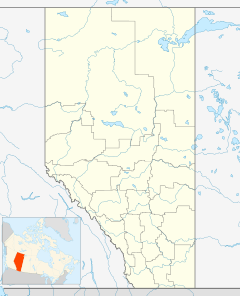Maleb, Alberta facts for kids
Quick facts for kids
Maleb
Conquerville
|
|
|---|---|
|
Locality
|
|
| Country | Canada |
| Province | Alberta |
| Region | Southeast Alberta |
| Census division | 1 |
| Municipal district | County of Forty Mile No. 8 |
| Founded | 1905 |
| Time zone | UTC−7 (MST) |
| • Summer (DST) | UTC−6 (MDT) |
| Postal code span |
List of T Postal Codes of Canada
|
| Area code(s) | +1-403 |
Maleb, once known as Conquerville, is a small community in southern Alberta, Canada. It's located within the County of Forty Mile No. 8. This area is about 23 kilometers (14 miles) south of Highway 3. It's also about 58 kilometers (36 miles) southwest of the city of Medicine Hat.
History of Maleb
Maleb, originally named Conquerville, has an interesting past. It started as a busy place in the early 1900s.
Early Days and Growth
Before Conquerville was founded, ranchers used this area. They traveled along the McLeod Trail to reach Fort McLeod. In the 1890s, this trail became a railway. The railway brought many people, including ranchers, to the Conquerville area. Coal was discovered here early in the 20th century. This discovery attracted coal miners to the community.
Around 1909, farming became very popular in Conquerville. Many farmers moved to the area, leading to a big agricultural boom.
Challenges and Revival
The First World War (1914-1918) brought good times to Conquerville. The harvests in 1915 and 1916 were very successful. However, after the war, the community faced tough times. A disease affected the local cattle, and the Spanish influenza (a serious flu) impacted many families.
To help the community recover, the government offered grants to farmers. They also gave land to new residents. These efforts helped Conquerville to revive and grow again. In 1945, the Conquerville school opened. This school brought together students from nine different smaller school districts.
Modern Times and Decline
In 1954, the community of Conquerville received electricity. This was a big step forward for the residents. In 1965, the community celebrated its 50th anniversary. They even published a book called Conquerville: a growing community to mark the special occasion.
However, starting in the 1980s, Conquerville began to shrink. The local high school closed because there weren't enough students. In 1992, part of the high school building was destroyed by fire.
Today, not much is left of the original community. You can still find a basketball court and a baseball field. The ruins of the old high school are still there, covered in weeds. A local farmer now uses the old school for storage. The community hall is still nearby and is sometimes used for events. Only a few people still live in Maleb. Many believe that the community started to decline when its school closed.
 | Madam C. J. Walker |
 | Janet Emerson Bashen |
 | Annie Turnbo Malone |
 | Maggie L. Walker |


